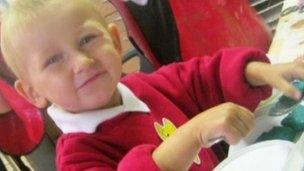Daniel Pelka: Head says school acted appropriately
- Published

Daniel's mother, Magdelena Luczak, and her partner, Mariusz Krezolek, are serving life sentences
The former head teacher at the school where Daniel Pelka was seen scavenging for food says he will think of the boy for the rest of his life.
Darren Clews said he had asked himself many times if he "could have done more" to prevent the child's death.
He said he believed he and his staff had acted appropriately, given what they knew at the time.
The four-year-old was starved, then murdered at his Coventry home in March 2012 by his mother and her partner.
Magdelena Luczak and Mariusz Krezolek are serving life sentences for the murder.
Teachers from his school, Little Heath Primary in Coventry, spoke of him stealing food from other children and scavenging in bins.
Food locked away
The school raised concerns about his weight and the deputy head teacher rang Daniel's GP, who examined him and put him on a course of nutritional tablets.
But the murder trial heard how his mother, Luczak, convinced both teachers and medical professionals alike that Daniel's dramatic weight loss was due to a rare genetic disorder rather than the abuse he was suffering.
So much so that the school took steps to prevent Daniel from consuming excessive amounts of food by "locking" it away.
Mr Clews said: "I was devastated by what happened to Daniel and will think of him for the rest of my life.
"All the concerns we had about Daniel were based on the limited information available to us and were passed on to the relevant agencies that we thought were best placed to help Daniel, as well as offer advice to the school on how to manage the issues under investigation.
"These services included the school nurse, Daniel's GP and the Community Health and Education Welfare Service.
"Despite this, I have asked myself many times if I could have done more but I believe that my staff and I followed all the procedures we felt were appropriate to take given what we knew during the six months that Daniel was with us.
"During that time, his teachers and I did raise concerns with his mother and believed we were working together to get to the bottom of these issues."
'Acted differently'
He added: "It was at the school's request that Daniel was referred to a paediatrician, with his mother's consent, and we also sought the help of a Polish-speaking teacher to speak privately with Daniel. Both suspected that Daniel had special needs and further lines of inquiry were progressing when he died.
"Had we doubted for an instant that his mother was not the concerned parent she professed to be, we would, of course, have acted very differently."
The serious case review, by the Coventry Safeguarding Children Board, into the death said the potential for emotional abuse or neglect was not considered when it should have been.
It recommends that heads keep a much closer eye on children they are concerned about and ensure senior staff meet every few weeks to discuss such children.
Schools and academies should also have a robust system for recording any injuries or welfare concerns noticed about a child by staff. And they should ensure that any necessary actions to address those concerns are taken.
It stressed that the roles and responsibilities of staff in charge of safeguarding should be clearly understood and utilised effectively.
The review said: "Head teachers should ensure that school staff including the attendance officer, learning mentor, special educational needs co-ordinator and senior management within school should meet twice per term to discuss children with a number of different concerns."
This was particularly important for those children who are not yet assessed by social workers as in need of assistance, for those with low attendance, where English is a second language or where there are special educational needs, it added.
'Appalling tragedy'
General secretary of the Association of School and College Leaders, Brian Lightman, said schools already monitored children causing concern very closely adding the recommendations were far too prescriptive.
"School staff already have discussions about pupils and it should be up to them to decide who to involve.
"The key issue is that schools have appropriate procedures in place to monitor children causing concern. Some schools may have daily meetings, some weekly meetings and some twice-termly meetings. It should be up to the school to decide."
A Department for Education spokeswoman said it had very clear guidance on working together and keeping children safe.
As soon as any professional thinks or sees there is a problem they should refer it to social services, she added.
National Association of Head Teachers leader Russell Hobby said Daniel Pelka's story was "an appalling tragedy".
"Heads cannot prevent all human evil without treating every parent as a potential criminal but they will always ask whether they could do more and always seek to learn when things go wrong," he said.
He said many of the recommendations were already in place in schools and added there needed to be degree of flexibility around how schools administered them.
"What is right for a small primary school may be wholly inappropriate for a large secondary," he added.
- Published17 September 2013
- Published17 September 2013
- Published17 September 2013